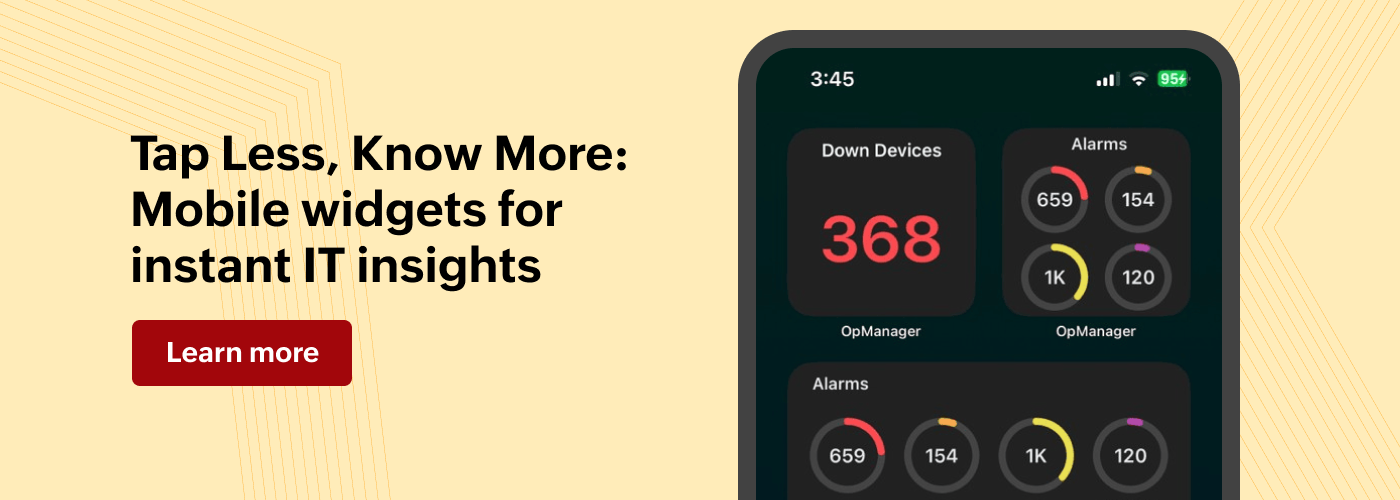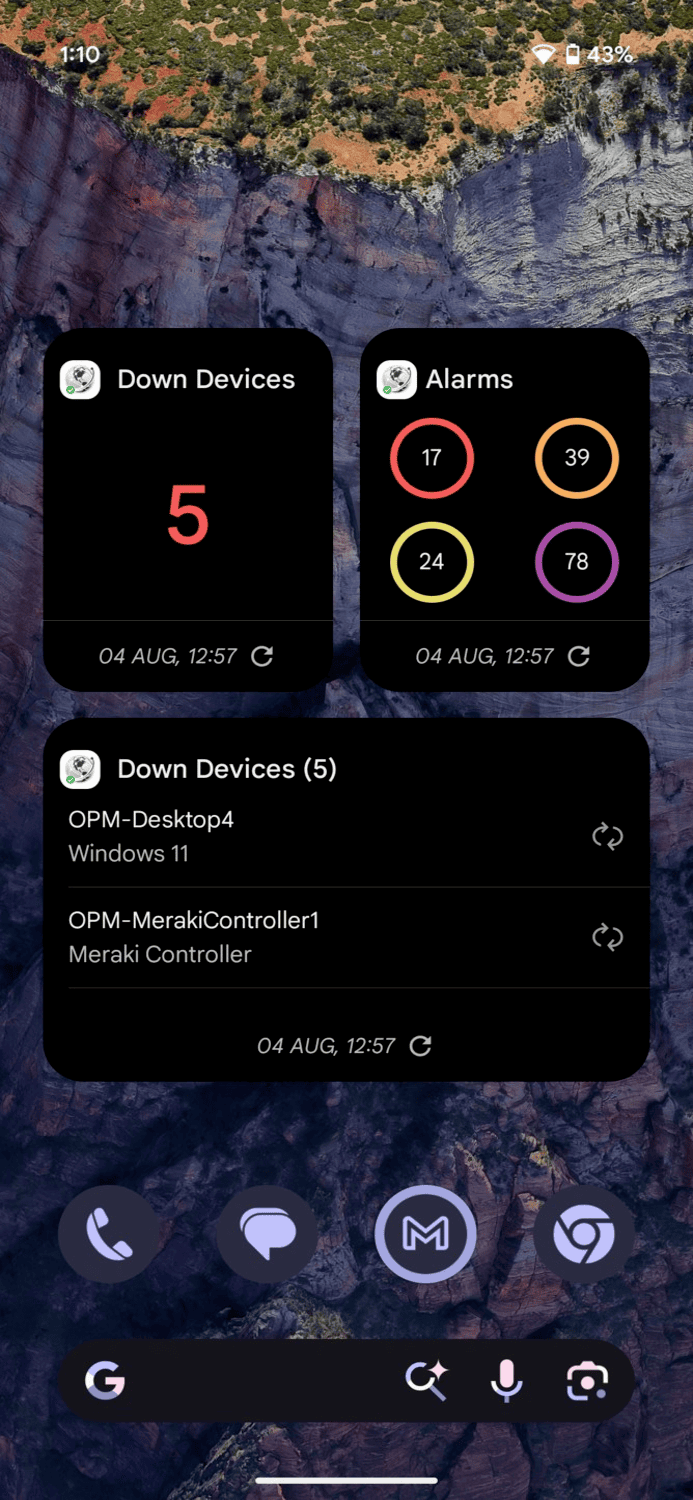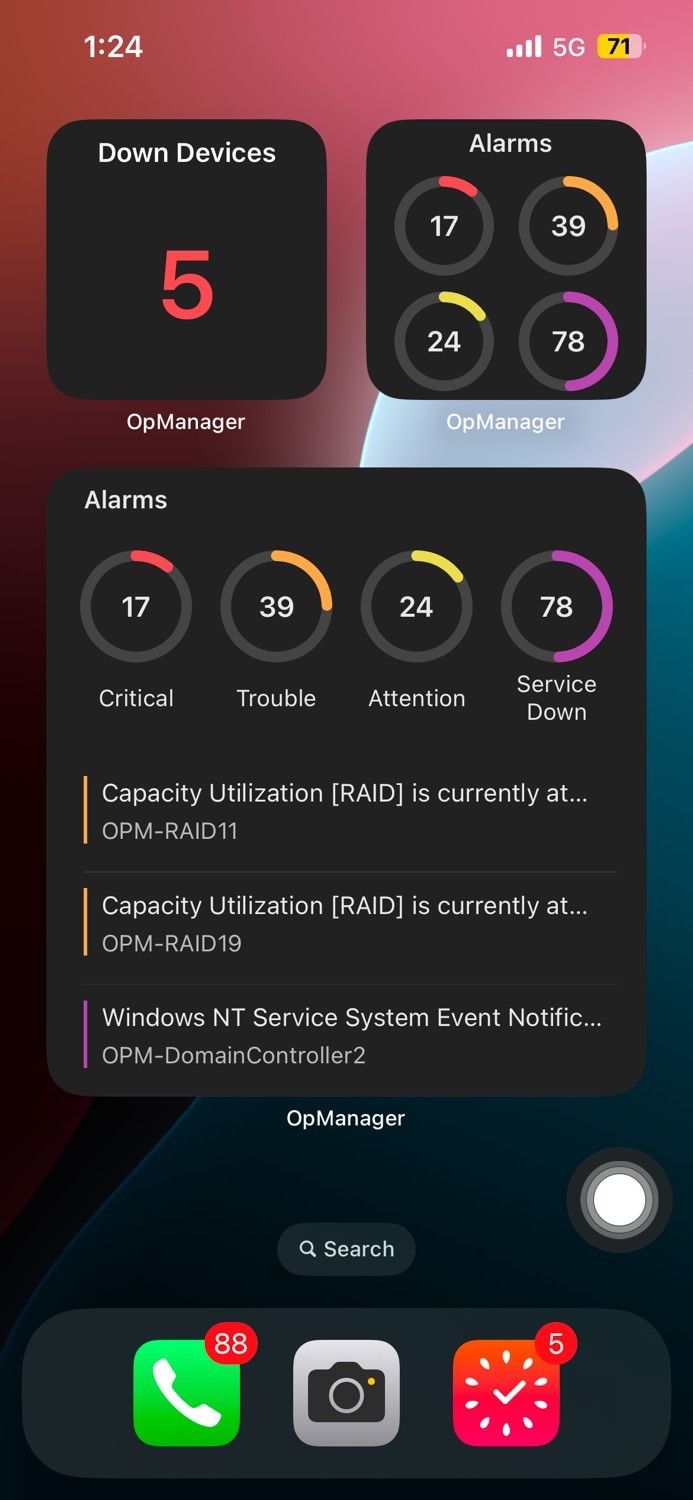Stay ahead of downtime: OpManager’s new mobile widgets redefine on-the-go network monitoring

In today’s mobile-first IT world, the difference between reacting late and staying ahead lies in how quickly you access critical data. For network admins who are always on their toes, waiting to open the app to check for alarms or down devices can be a bottleneck. That’s where OpManager’s latest mobile app upgrade comes in, with interactive home screen widgets designed to deliver instant visibility and control—without even launching the app.
What’s new?
You can now add Down Devices and Alarms as widgets directly to your home screen, bringing real-time network insights within immediate reach. Whether you’re managing a large enterprise or a dynamic SMB setup, these widgets allow you to act fast, stay informed, and reduce response times—all from the palm of your hand.
Down Devices widget: See issues, ping fast
Imagine spotting a device down while walking between meetings. Instead of navigating through the app, you can now tap the widget, view the device list, and initiate a ping test right from your home screen.
This isn’t just a shortcut. It’s a direct line to availability checks, letting you eliminate delays when every second matters. Whether it’s a switch in a branch office or a core router, troubleshooting starts with a tap.
Alarms widget: Alerts that stay until you act
Previously, severity-based alerts from OpManager were accessible only through the Alarms tab within the app. Now, with the new alarm widget, you can view real-time alert counts directly on your mobile home screen.
You can view alarm counts by severity (Critical, Trouble, or Attention) and tap into each to see the full list. What makes this powerful is the layered filtering you can apply.
Powerful filtering options
You can configure each widget with tailored filters to suit your monitoring needs:
Time: Choose from quick time windows like Last 1 hour, Today, or deep windows like Last 90 days (on Android).
Event type: Filter by active alarms, event logs, syslogs, traps, and even module-based alerts (e.g., NFA, NCM, FWA, Web, Application).
Acknowledgement status: Display only acknowledged or unacknowledged alerts.
Category: Focus on specific device types: routers, switches, servers, RAID, load balancers, and more.
Multiple widgets, zero rework
You can add multiple alarm widgets, each with different filters. For instance:
One widget for unacknowledged firewall alerts from the NCM module in the past four hours.
Another for switch-related issues that are pending acknowledgment over the past seven days.
With this setup, you won’t need to toggle filters every time. Each widget serves a purpose: to be static, persistent, and always ready.
You can also view the widgets in different layouts:
Just the alarm count.
The alarm count plus the alert list, which links to detailed views (Alarm details page) inside the app.
Android vs. iOS: Feature differences at a glance
While both platforms support widgets, there are slight OS-specific differences in filter flexibility:
Filters | Android | iOS |
Time | Up to 90-day range, more granular options | Supports commonly used time ranges, including recent hours and days |
Event types | Includes traps, logs, NFA, NCM, etc. | Includes correlated events and application events, in addition to those captured by Android |
Categories | Covers most device categories based on the devices connected to the server | Covers most device categories based on the devices connected to the server |
Scrolling | Full scrollable alert list | Only 3–5 alerts visible, no scroll |
 |  |
Why these widgets matter
Speed matters: Ping devices instantly from the home screen; skip the app drill-down.
Persistent visibility: Unlike push notifications that disappear, alerts on widgets remain until cleared.
Tailored monitoring: Preconfigure widgets for your unique network roles; no more repeated filter selection.
On-the-go readiness: Get all critical network metrics at a glance, even when you're away from the desk.
Final thoughts
No other network monitoring app offers this level of granularity, customization, and real-time control on mobile. With these new widgets, OpManager empowers network admins to cut downtime, improve response speed, and manage complex environments with ease—even when they’re not at their desks.
Whether you’re commuting, on-site, or simply away from the console, you’re still connected to your network: live and alert.
Try the new widgets today. Configure once. Monitor always.
Download the latest version of our mobile app to unlock interactive widgets right on your home screen!